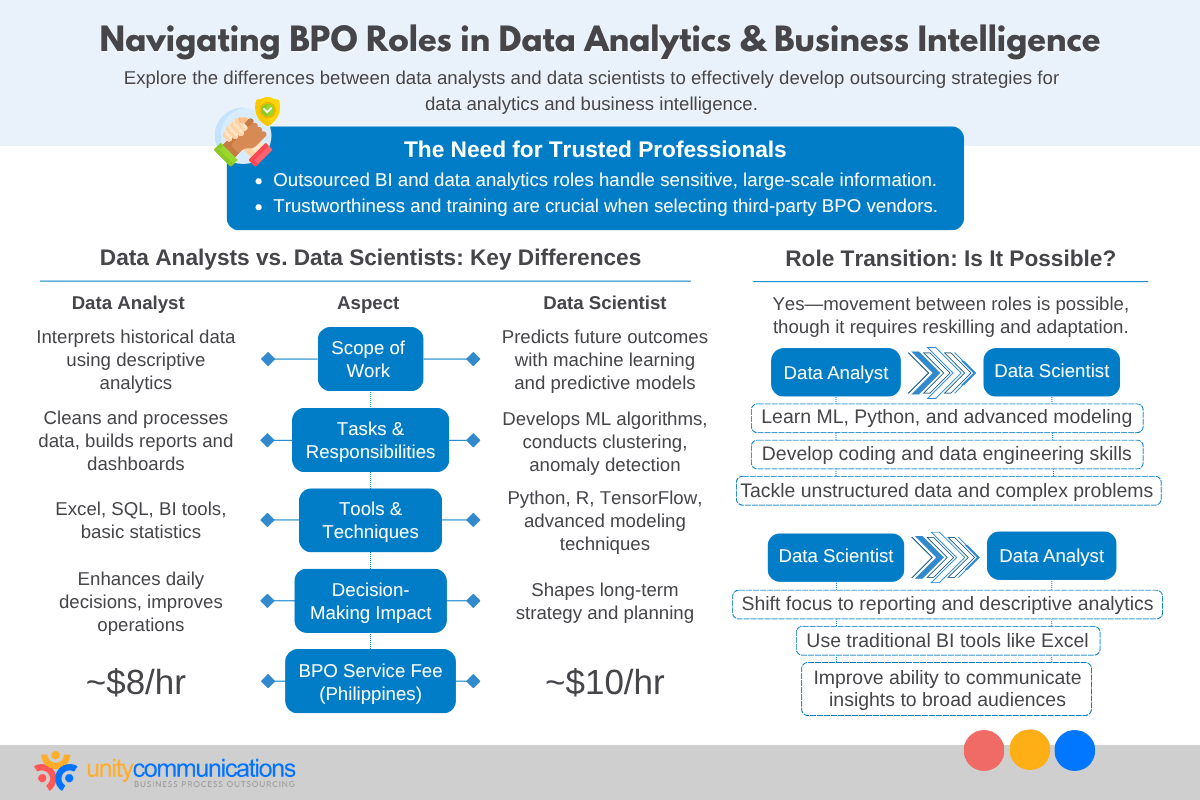IN THIS ARTICLE
Table of Contents
In the current age of information overload, companies constantly seek more innovative and efficient ways to make sense of their big data. These insights inform their decisions and actionable plans, helping strengthen their market standing.
However, what happens when this function becomes the source of your inefficiency?
This is where business process outsourcing (BPO) steps in. Service providers offer cost-effective data analytics solutions to guide you toward continued success. They combine human expertise and cutting-edge technology to streamline your business intelligence (BI) tasks.
Continue reading to learn how they achieve this.
What Are Data Analytics and BI Outsourcing?

Entrusting your BI functions to a third party is what BPO means in the data analytics sector. Enterprises hire service providers to boost data collection and analysis while cutting operating costs.
Aside from additional savings, third-party vendors give you access to a large talent pool with professionals skilled in handling and examining massive amounts of data. They combine this expertise with artificial intelligence (AI), machine learning (ML), and robotic process automation (RPA) tools to ensure accuracy and speed.
Due to the increasing need for cost efficiency and digitalization, businesses of all sizes rely on the BPO industry. The data analytics outsourcing market reached $8.5 billion in revenue in 2022, according to IMARC Group. The organization expects the sector to expand at a compound annual growth rate (CAGR) of nearly 32% by 2028.
Data Analytics and BI Tasks to Outsource
The decision to outsource specific data analytics and BI tasks depends on your goals, in-house challenges, and budget limits. For instance, your e-commerce company wants to understand what contact center channels buyers prefer to improve the customer experience.
However, you lack the necessary analytics tools and specialists to do so. You are also missing the funding required to gain these resources as you focus on improving your products during the holiday season. Hence, you tap an external team to handle your week-long market research, only paying a fixed or hourly fee for the duration.
If you ever decide to contract a BPO company in the long run, here are the common data analytics and BI functions you can outsource:
- Data entry, processing, and cleansing
- Data analysis, visualization, and reporting
- Predictive analytics and forecast modeling
- Statistical analysis and hypothesis testing
- Market research and competitive analysis
- BI software implementation and maintenance
- Data warehousing
- Data governance and compliance
- BI software user training and support
- Custom BI software development
- Data conversion and cloud migration
- Data mining and text analytics
- Data storage, backup, and recovery
Overview of BPO Data Analytics and BI Roles

As you seek to outsource various BPO roles and responsibilities for your data analytics and BI processes, you must know who will handle your sensitive information. Third-party professionals must be trustworthy and well-trained to handle massive amounts of data.
Suppose you aim to outsource your data analysis and reporting. Data scientists and analysts can handle this process, helping you understand how to strengthen your customer relationships. However, note that these two roles have varying service ranges and payments.
The Difference Between Data Analysts and Data Scientists
While both positions involve working with data, the key distinctions lie in the complexity of their tasks and the depth of analysis. Understanding this difference helps you plan your BPO investment well. Below, we discuss how you can distinguish a data analyst from a data scientist.
- Scope of work. Data analysts use descriptive analytics techniques to interpret historical information and deliver insights into past performance and current trends. Data scientists, meanwhile, employ predictive modeling, machine learning (ML), and advanced statistical strategies to forecast future outcomes and shifts.
- Tasks and responsibilities. Data analysts clean and process datasets to ensure accuracy. They generate reports and create visualizations to support day-to-day decision-making. Data scientists develop and implement complex ML algorithms and models for intricate tasks such as data mining, clustering, and anomaly detection.
- Tools and techniques. Data analysts use Excel, structured query language (SQL), and BI software. They rely on statistical methods to study data and draw insights. Data scientists employ advanced programming languages, such as Python or R. They optimize ML libraries and frameworks (e.g., TensorFlow) to generate models.
- Decision-making impact. Data analysts contribute to your daily decision-making for increased customer engagement and satisfaction. They support your operational decisions and help enhance efficiency. Meanwhile, data scientists influence long-term strategic decisions and guide your future planning.
- Salaries and service fees. Data scientists earn more than data analysts due to the higher difficulty level of their work. For example, you can expect to pay a data scientist $10 per hour when outsourcing to the Philippines. On the other hand, working with a Filipino data analyst can cost you an hourly rate of roughly $8.
Can a Data Analyst Become a Data Scientist and Vice Versa?
The transition from data analyst to data scientist and vice versa is possible, although it requires effort and upskilling. Data science and data analysis share some foundational skills and methods. However, they also have distinct focuses and requirements.
BPO providers specializing in data analytics and BI identify the specific skills and knowledge necessary for the target role. They take steps to help their employees adapt via continuous training and upskilling. Regardless, here is how the transition can occur in both directions.
Data Analyst to Data Scientist
- Acquire more advanced technical skills in ML, statistical modeling, and programming.
- Learn and understand advanced algorithms and programming languages (e.g., Python).
- Develop coding skills for tasks such as data manipulation and feature engineering.
- Know how to handle more complex problem-solving scenarios and unstructured data.
Data Scientist to Data Analyst
- Simplify skill set to focus on descriptive and diagnostic analytics and reporting.
- Adopt standard data analytics tools (e.g., Excel) and traditional BI software.
- Be familiar with techniques for reading and making sense of historical data.
- Enhance skills to communicate with a broader audience and non-technical stakeholders.
Ways to Effectively Utilize BPO Data Analytics Services

A successful BPO partnership demands in-depth market research and strategic planning. You must understand how to effectively utilize BPO to boost your data analytics and BI functions.
Knowing what you aim to achieve with strategic outsourcing can also drive your business growth. Improve your decision-making and gain a competitive market advantage by implementing the following strategies:
Specify BPO Objectives and Needs
Clarify your goals and needs before outsourcing your data analytics and BI tasks. Whatever you want to attain with a provider, ensure you understand why you aim to engage in this transaction. Doing so guarantees your BPO objectives align with your in-house business targets.
Enumerate the service scopes and deliverables expected from your potential BPO partner. List the types of outcomes, analyses, reports, and dashboards you require. Create realistic timelines to track your progress and ensure timely project completion.
Establish Data Requirements and Project Turnaround Times
Relay your data requirements clearly with your potential BPO provider. Identify the types of data sources and quality standards for analysis and reporting. This step ensures the third-party vendor understands your data context.
Develop realistic timelines for project completion and determine key milestones to help track progress, ensuring both parties meet the expected project delivery timeline.
Choose the Best BPO Partner
Seek a provider with a proven track record and expertise in delivering cost-effective and high-quality data analytics services. Consider factors such as industry experience, technological capacity, and the ability to scale operations based on your needs.
Perform market research and background checks as you screen and assess your potential BPO partner. Ask for recommendations and referrals from colleagues and previous clients. This way, you understand how a BPO provider might handle your data analytics functions.
Validate Quality Human and Tech Resources
As you look for the right service provider, verify its workforce’s qualifications and skills related to data analytics and BI services. Evaluate the third-party team’s educational backgrounds, certifications, and relevant experiences in handling projects similar to yours.
Moreover, assess the vendor’s technology stack. Ensure they use modern and relevant tools to work on your data analytics and BI tasks faster and more effectively. Confirm the BPO infrastructure’s compatibility with your organization’s existing technologies.
Negotiate and Finalize a Service-level Agreement (SLA)
As you negotiate a contract upon selecting a BPO partner, specify your expected service levels, performance metrics, and response times. Clarify data quality standards, reporting formats, and key performance indicators (KPIs).
Before finalizing an SLA, ensure you and your provider discuss and agree upon the BPO pricing structure. Define payment terms and conditions, including invoicing schedules, billing channels, and exit fees. Emphasize transparency in cost breakdowns.
Match Data Analytics Techniques
Work closely with the BPO provider in planning and developing data analytics techniques. Apart from negotiating SLA terms and conditions, discuss ways to align data analytics efforts and overall business and BPO goals with your partner.
Define the data analytics techniques your organization needs, such as descriptive or predictive analytics. List the business questions and challenges you want to address through these strategies.
Establish Centralized Communication Channels
Set up core communication channels to facilitate regular updates, feedback, and collaboration with your BPO vendor. Ensure connectivity lines are always open for seamless interactions between your in-house and third-party teams. This feature is especially crucial during remote data-sharing activities and emergencies.
Additionally, assign a project manager or centralized unit to oversee your transactions with the BPO company. Ensure the assigned teams know the ins and outs of leading remote transactions for your data analytics and BI requirements.
Highlight Data Security and Compliance
When outsourcing your data analytics and BI processes, prioritize data security and compliance. Work with a BPO firm that has robust security measures and adheres to data protection standards. Include clear data access levels and confidentiality requirements in your SLAs.
This strategy can prevent the waste of millions of dollars due to cyber threat mitigation efforts, potential lawsuits, or unexpected violation fees. When highlighting data protection and compliance, you can save about $4.45 million in breach expenses.
Support Training and Knowledge Transfer
Facilitate knowledge transfer between your in-house and third-party units. Provide the necessary materials to support training and skill development sessions. Ensure the BPO team learns how to handle your data effectively and securely.
More importantly, share a domain-specific knowledge base regarding your data analytics and BI processes. Building a mutual understanding enhances the effectiveness of the BPO partnership.
Conduct Regular Performance Reviews
Perform frequent performance reviews to measure the effectiveness of BPO data analytics services. Use your agreed-upon KPIs to monitor your third-party team’s progress and output. Regular tracking allows you to identify areas for improvement and ensure the BPO partner meets your expectations.
Schedule how often you will conduct this evaluation. You can set this action monthly, quarterly, or per the project’s timeline. The frequency may vary based on the nature of the work and the level of detail needed.
Foster Continuous Process Improvement and Feedback
In addition to regular performance reviews, foster a culture of continuous improvement while outsourcing your data analytics. Assess the effectiveness of these BPO services and identify opportunities for enhancement.
Collect feedback from both teams to immediately determine and address data analytics-related challenges. Encourage your provider to treat the engagement as a partnership rather than a transaction as much as possible. Establish a mutual understanding that feedback equals process improvement.
Benefits of BPO in Data Analytics

Expect to achieve short-term or long-term benefits once you implement those best practices. Recent data from Deloitte shows that outsourcing’s most tangible advantages include cost reduction, process efficiency, and standardization. Other perks include the following:
- Outsourcing data analytics tasks cuts significant costs. The practice lets you avoid the expenses associated with hiring and training in-house data analytics teams. You also do not need to invest in the technology required for advanced analytics.
- BPO providers employ specialists in data analytics, ML, and statistics. Outsourcing gives you access to a diverse skill set without worrying about extensive in-house training and related expenses.
- Vendors let you focus on core business activities and strategic goals. Outsourcing your routine analytics tasks allows you to allocate more time and resources to areas with a competitive edge.
- Scalable BPO services help you adapt to recent market trends. Providers adjust the level of analytics support based on your business needs. This flexibility is crucial during increased data analysis demands, such as marketing campaigns or seasonal industry shifts.
- Providers optimize the latest technologies for efficient data management. This results in faster turnaround times for generating reports and visualizations. Such insights help you make decisions related to customer satisfaction initiatives in real time.
- BPO firms execute data security, compliance, and risk management strategies. Providers assist you in mitigating the challenges associated with data handling and analysis. Their risk mitigation measures help ensure adherence to industry regulations.
- BPO vendors are more adaptable to emerging tech trends in data analytics. This capability ensures their clients benefit from the latest advancements without worrying about extra infrastructure maintenance expenses.
- You can quickly deploy BPO human and tech resources. Doing so allows you to initiate data analytics projects within days or weeks when you urgently need them. It eliminates the lead time required for hiring and training an in-house team.
The Bottom Line
Leveraging BPO services for your data analytics and BI functions involves understanding the concepts behind the practice. You must learn which professionals—data analysts or data scientists—you should work with to plan your outsourcing investment well.
In addition, exercising the practical ways discussed will guide you in maximizing a BPO partnership. You must clarify your goals, select a reliable provider, and emphasize information security. Doing so lets you optimize the advantages listed above.
Let’s connect and strike a potential BPO deal to boost your data analytics processes, especially in customer servicing. Unity Communications employs skilled professionals and robust solutions to ensure improved operational efficiency and increased cost savings.





